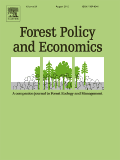
Forest Policy and Economics
Scope & Guideline
Empowering research for a greener tomorrow.
Introduction
Aims and Scopes
- Interdisciplinary Research:
The journal publishes studies that integrate various disciplines, including economics, environmental science, sociology, and policy analysis, to provide a holistic understanding of forest-related issues. - Forest Policy Analysis:
A core focus is on analyzing forest policies at local, national, and international levels, examining their effectiveness, implementation challenges, and socio-economic impacts. - Economic Assessment of Forest Resources:
Research includes evaluations of the economic benefits of forest products, ecosystem services, and the implications of market dynamics on forest management. - Sustainability and Climate Change:
The journal emphasizes research on sustainable forest management practices and the role of forests in climate change mitigation and adaptation. - Community Engagement and Governance:
Studies on participatory governance, stakeholder engagement, and the role of local communities in forest management are key areas of interest. - Innovative Management Practices:
Exploration of new management practices, technologies, and economic models that enhance forest productivity and conserve biodiversity.
Trending and Emerging
- Bioeconomy and Non-Timber Forest Products:
There is a growing emphasis on the bioeconomy, particularly the sustainable use of non-timber forest products, which indicates a shift towards recognizing the economic potential of diverse forest resources. - Climate Change Adaptation and Resilience:
Research focused on strategies for enhancing resilience to climate change impacts is on the rise, showcasing the critical role forests play in global climate adaptation efforts. - Participatory Governance Models:
Emerging studies are increasingly examining participatory governance models, emphasizing the importance of community involvement in forest management and decision-making processes. - Digital Innovations in Forestry:
The adoption of digital technologies and data-driven approaches in forest management is a trending theme, reflecting the need for innovative solutions to modern forestry challenges. - Social Equity in Forest Management:
A growing body of research is addressing social equity issues within forest management, focusing on gender, indigenous rights, and the socio-economic implications of forest policies. - Ecosystem Services Valuation:
There is an increasing trend in assessing and valuing ecosystem services provided by forests, which supports informed policy-making and sustainable management practices.
Declining or Waning
- Traditional Timber Production Focus:
Research centered solely on traditional timber production and its economic implications has seen a decrease, as the journal increasingly prioritizes studies addressing broader ecosystem services and sustainability concerns. - Static Policy Frameworks:
There is a noticeable reduction in papers that analyze static or outdated policy frameworks, indicating a shift towards dynamic, adaptive policy approaches that consider changing environmental and social contexts. - Narrow Economic Analyses:
Papers focusing exclusively on narrow economic analyses of forest products without considering social or environmental impacts are becoming less frequent, reflecting a broader interest in integrated assessments. - Single-issue Studies:
The frequency of studies concentrating on single issues, such as specific forest diseases or localized economic impacts, is declining in favor of comprehensive studies that address multiple interrelated factors.
Similar Journals

Journal of Forest Research
Shaping the future of forest ecosystems through impactful research.Welcome to the Journal of Forest Research, a pioneering publication dedicated to advancing the field of forestry and sustainable ecosystem management. Published by Taylor & Francis Ltd and boasting an impressive Q2 ranking within its category, this journal highlights significant research contributions and innovative practices in forest science. With an ISSN of 1341-6979 and E-ISSN of 1610-7403, the journal spans a fruitful history from 1996 and continues to be an influential platform up to 2024. The Scopus rank places it at an esteemed #55 out of 174 in the realm of Agricultural and Biological Sciences, reflecting its high impact within the community. While this journal is not open access, it offers targeted content for researchers, professionals, and students seeking to deepen their understanding of forest ecosystems and promote sustainable practices. Join us in exploring the intricate relationship between society and forests, and contribute to a crucial dialogue on environmental stewardship.
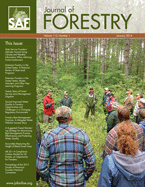
JOURNAL OF FORESTRY
Fostering interdisciplinary collaboration for a greener future.JOURNAL OF FORESTRY, published by OXFORD UNIV PRESS INC, is a premier academic journal dedicated to advancing the field of forestry and plant sciences. With a distinguished history dating back to 1919, the journal has evolved to address contemporary challenges and innovations in these critical domains of environmental science. As evidenced by its impressive Q1 rankings in both Forestry and Plant Science categories for 2023, the journal is recognized for its contribution to scholarly research, occupying a significant position among its peers with a Scopus rank of #33 in Forestry and #122 in Plant Science. Researchers and practitioners can access the journal’s articles to stay updated on cutting-edge research, methodologies, and practices that influence sustainable forest management and conservation efforts. By fostering interdisciplinary collaboration, the JOURNAL OF FORESTRY plays a pivotal role in shaping the discourse surrounding forest ecosystems, promoting the integration of science with practice, and facilitating knowledge transfer in academia and industry. As a vital resource for researchers, professionals, and students alike, this journal serves as an essential platform for disseminating high-quality research that addresses pressing environmental concerns.
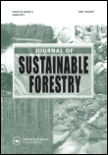
Journal of Sustainable Forestry
Innovating forestry research for a resilient planet.Journal of Sustainable Forestry is a premier academic publication dedicated to advancing knowledge and practices in the field of sustainable forestry and environmental management. Published by Taylor & Francis Inc in the United Kingdom, this journal has been a cornerstone for researchers and professionals since its inception in 1992. With an impressive reputation, it boasts a 2023 Q2 ranking in Food Science, Forestry, and Geography, Planning and Development, highlighting its significant contribution to interrelated disciplines. The journal’s impact is further underscored by its Scopus ranking, especially in Forestry where it holds the 43rd position out of 174 publications, placing it in the 75th percentile. Although not open access, the journal remains committed to providing innovative research and practical insights into forest management, ecological sustainability, and policy development. As the field of sustainable forestry continues to evolve, the Journal of Sustainable Forestry serves as an essential resource for those committed to advancing sustainable practices globally, fostering a deeper understanding of how sustainable forestry can contribute to environmental resilience and biodiversity conservation.
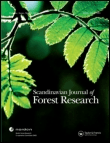
SCANDINAVIAN JOURNAL OF FOREST RESEARCH
Championing Ecological Balance through Forest ResearchSCANDINAVIAN JOURNAL OF FOREST RESEARCH, published by Taylor & Francis AS, is a leading peer-reviewed journal dedicated to advancing knowledge in the field of forestry. With an impressive ranking of Q2 in the Forestry category for 2023 and a Scopus rank of #57 among 174 journals in Agricultural and Biological Sciences, this journal serves as a vital resource for researchers, professionals, and students. Its broad scope encompasses various aspects of forest research, including ecology, management, and conservation, making it indispensable for those involved in the sustainable stewardship of forest resources. The journal is available through subscription, ensuring high-quality research dissemination while maintaining rigorous academic standards. With continuous publication from 1986 to the current year, it stands as a significant contributor to the global conversation on forest science, highlighting the importance of forest ecosystems in ecological and socio-economic contexts.

BALTIC FORESTRY
Transforming Forestry Through Cutting-Edge ResearchBALTIC FORESTRY, published by the INST FORESTRY LRCAF in Lithuania, is a prominent academic journal that serves as a platform for disseminating cutting-edge research in the field of forestry. With an ISSN of 1392-1355, this journal is dedicated to advancing knowledge on sustainable forest management, ecological impacts, and resource conservation, among other vital topics. As of 2023, it has been categorized in the Q3 quartile for forestry in Scopus, indicating its solid reputation among peer-reviewed publications, ranking #95 out of 174 in the realm of Agricultural and Biological Sciences. BALTIC FORESTRY features contributions from researchers across the globe and encourages innovative approaches to solving contemporary challenges in forestry, making it an essential resource for professionals, scholars, and students alike. Although it operates under subscription-based access options, the journal's commitment to fostering academic discourse is unwavering, aiming to bridge the gap between theory and practice in forest science.

Lesnoy Zhurnal-Forestry Journal
Exploring the Frontiers of Forestry ScienceLesnoy Zhurnal-Forestry Journal is a prominent academic publication dedicated to advancing the field of forestry and environmental sciences. Published by the Northern Arctic Federal University M. V. Lomonosov, this journal focuses on innovative research, practices, and policies related to forestry management and conservation. With an Open Access model established since 2015, the journal ensures widespread dissemination of knowledge and foster collaborative research across global scholarly communities. Located in Arkhangelsk, Russia, the Lesnoy Zhurnal appeals to researchers, professionals, and students alike, providing a platform for sharing valuable insights and addressing emerging challenges in forestry. Though specific metrics like HIndex and Scopus rankings are presently unlisted, the journal is committed to excellence and aims to enhance its visibility and impact within the scientific community. This publication is not only a critical resource for ongoing research but a key player in shaping sustainable forestry practices in a rapidly changing environment, making it indispensable for anyone involved in forestry and environmental studies.

Journal of Forest Economics
Pioneering Research for a Greener TomorrowJournal of Forest Economics is a leading academic journal published by NOW PUBLISHERS INC, dedicated to advancing the field of forest economics through rigorous interdisciplinary research. Established in 1995, the journal has become a critical platform for disseminating knowledge, focusing on the economic aspects of forestry, ecology, and environmental management. With its current impact factor, it holds a respectable Q3 quartile ranking across various categories including Ecology, Forestry, and Geography, Planning and Development, reflecting its relevance in these fields. The journal ensures wide accessibility to its research and caters to the scholarly community interested in the sustainability and economic viability of forest resources. The Scopus ranks further underscore its standing, highlighting its influence in the domains of Economics, Agricultural Sciences, and Environmental Science. As the landscape of forest economics continues to evolve, the Journal of Forest Economics remains an essential resource for researchers, professionals, and students striving for innovative solutions in forest resource management.
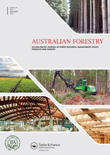
AUSTRALIAN FORESTRY
Shaping Policies for a Greener FutureAustralian Forestry is an esteemed journal dedicated to advancing knowledge in the field of forestry and related environmental science. Published by Taylor & Francis Australia, this journal plays a pivotal role in disseminating high-quality research that spans various aspects of forestry, including sustainable management, conservation practices, and policy analysis. With an impact factor reflecting its significance in the academic community and a Scopus rank of #44 out of 174 in the category of Agricultural and Biological Sciences, Australian Forestry proudly holds a Q2 ranking in its field as of 2023. The journal has maintained a continuous publication record since its inception in 1936, with a commitment to addressing contemporary challenges within forestry. Researchers, professionals, and students alike are invited to engage with this vital resource that fosters insightful dialogue, innovative solutions, and a deeper understanding of forestry science.

Central European Forestry Journal
Advancing forestry research for a sustainable future.Central European Forestry Journal, published by SCIENDO, is a pivotal platform dedicated to advancing research and knowledge in the field of forestry. Since its inception in 2009, this Open Access journal has provided scholars and practitioners with unrestricted access to cutting-edge research findings, promoting collaboration and innovation within the forestry community. Based in Poland, the journal serves as a crucial resource for researchers, professionals, and students alike, addressing critical topics relevant to the management, conservation, and sustainable utilization of forest resources. The journal holds a commendable Q2 ranking in Forestry, with a notable rank of 51 out of 174 and a 70th percentile in Scopus's Agricultural and Biological Sciences category. With converged publication from 2017 to 2024, the Central European Forestry Journal represents an essential avenue for disseminating knowledge and fostering dialogue in an increasingly important field.

Revista Forestal Mesoamerica Kuru-RFMK
Connecting researchers to nurture Mesoamerican forests.Revista Forestal Mesoamerica Kuru-RFMK is a vital academic platform dedicated to the advancement of forest science and management within the Mesoamerican region. Published by the Instituto Tecnológico de Costa Rica, this journal has been an Open Access resource since 2011, ensuring that critical research is accessible to a global audience. With an ISSN of 2215-2504, it aims to foster collaboration and knowledge exchange among researchers, professionals, and students eager to address the pressing challenges facing forests in Central America. The journal prioritizes interdisciplinary studies related to forest ecology, conservation, and sustainable management practices, making it an indispensable reference for anyone interested in enhancing forest health and biodiversity. By contributing to this resource, scholars can impact policy and practice while enriching the academic community’s understanding of Mesoamerica's unique forest ecosystems.